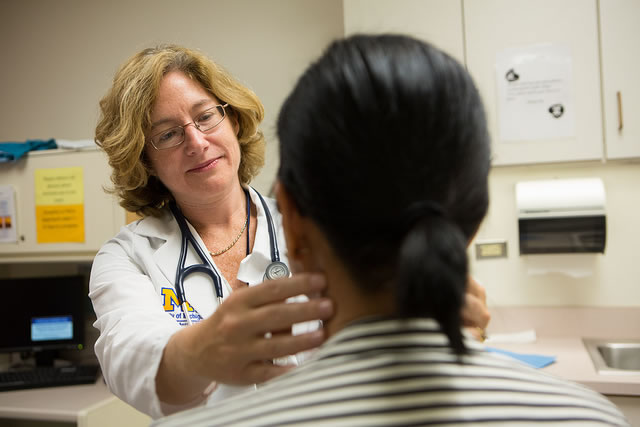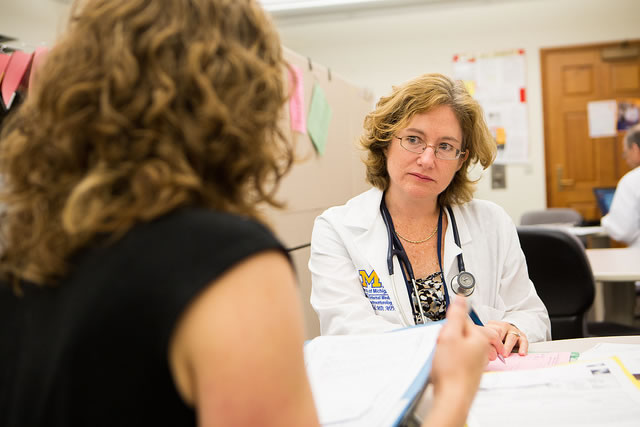Hereditary Colon Cancer Syndromes

A Q&A with Elena Stoffel, M.D., director of cancer genetics at the U-M Rogel Cancer Center
Q: How often are colon cancers the result of faulty genes?
About 3 percent of colon cancers are associated with genetic mutations inherited from birth. Most hereditary colon cancers can be traced to one of two different syndromes, Familial Adenoma Polyposis (FAP), and Lynch Syndrome.
Q: Give us an overview of FAP and its link to colon cancer.
FAP, which accounts for 1% of colon cancer cases, arises from a mutation in the APC gene. People born with one faulty copy of that gene can begin developing colon polyps as early as their pre-teen years. Unlike the colon polyps screened for and removed during routine colonoscopies – the colons of FAP patients are virtually carpeted with polyps, numbering in the thousands.
Although clinical researchers like me are developing and testing alternatives to slow the growth of polyps in FAP patients, for the vast number patients, the only treatment is surgical removal of the colon. If the colon is not removed, their risk of developing cancer exceeds 90%.
Q: Once the colon is removed, is the FAP patient’s risk of cancer eliminated?
After colectomy, polyps can still develop in the small intestine. So patients require continued observation throughout their lives.
Q: Tell us about the other hereditary condition, Lynch Syndrome.
Lynch Syndrome, which used to be called hereditary non-polyposis colorectal cancer or HNPCC, is the most common hereditary colon cancer condition, responsible for 2.5% of all colon cancers. Lynch Syndrome results in polyps that are far fewer in number than FAP, but still potentially deadly. While colon cancer is normally slow-growing, that’s not the case in Lynch Syndrome patients. Their polyps develop when they are relatively young, growing and becoming cancerous very quickly. Patients have been known to develop colon cancers between regularly scheduled colonoscopies. Therefore, patients who have Lynch Syndrome should begin aggressive screening at age 20 to 25 with yearly colonoscopies.
Q: Are FAP and Lynch Syndrome easily diagnosed?

A family history of colorectal cancer diagnosed in multiple relatives can be an important clue. Because FAP is often characterized by the development of hundreds of colon polyps, in some patients the diagnosis can be made based on colonoscopy findings and confirmed through genetic testing for the associated gene mutation. Children of people with FAP have a 50/50 chance of inheriting the effected gene, and genetic testing can help identify which family members are at risk. But with Lynch Syndrome, the warning signs aren’t so obvious. Unless a detailed family history is available, there would be no reason to suspect it, and many patients have normal colonoscopy exams, so in most families the diagnosis of Lynch Syndrome is only made when someone develops cancer. Lynch Syndrome patients face a 60% to 80% risk of developing colon cancer, and for female patients, an up to 40% risk of uterine cancer as well; however most of these cancers could be prevented with specialized screening beginning at young ages.
Q: What can be done to identify Lynch Syndrome patients sooner?
I was part of an American Society of Clinical Oncology group that wrote a position statement stressing the importance of reviewing family history of cancer in all cancer patients. The University of Michigan and other top cancer centers also test all colorectal tumors to screen for DNA mismatch repair, which can be seen in the setting of gene mutations associated with Lynch Syndrome. This approach makes it more likely that patients at risk for Lynch Syndrome will be identified in time to prevent future cancers.
Q: What’s the one thing you want patients and families to know about hereditary colon cancer?
Our goal is to prevent the vast majority of all colon cancers, including those set in motion by a faulty gene. Colon cancer is highly preventable through screening. Even in people who have inherited gene mutations, we can dramatically reduce their risk of cancer with appropriate screening and follow-up.
Continue learning about the Cancer Genetics Clinic and hereditary cancers
- Cancer Genetics Clinic
- Trust Your Instincts: How one patient tracked her family's history of cancer
- Finding Support When You Don't Have Cancer
